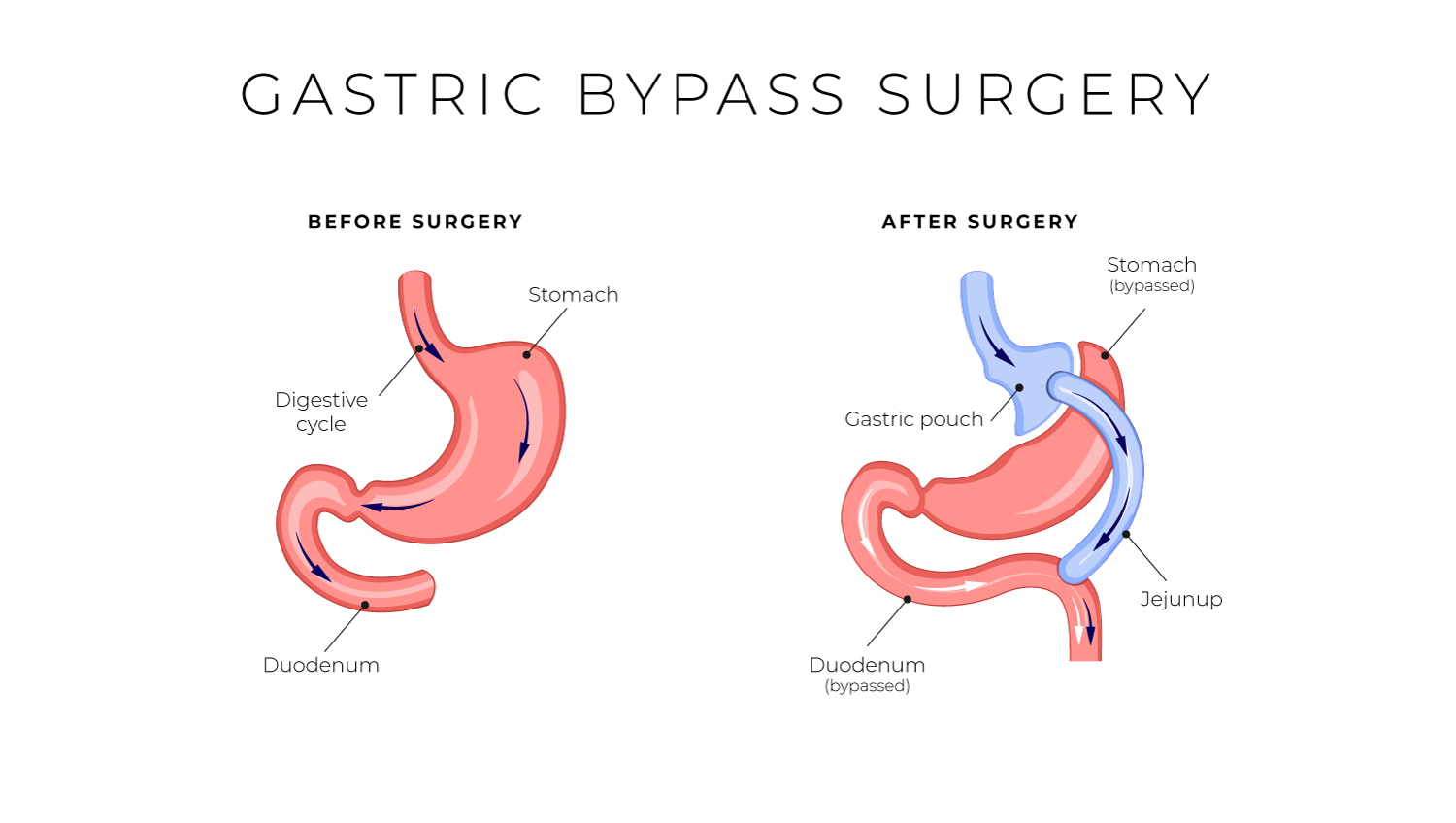Laparoscopic gastric bypass surgery
Gastric bypass - is the combined surgery procedure, during which both the volume of the stomach (by almost 90%) and the length of the digestive tract is reduced. From the upper part of the stomach a small stomach pouch of 15-30 ml volume is created. Thanks to this, a very little amount of food is enough to experience the satiety. (The pouch restricts the food intake at one time and the patient experiences the early satiety).
Usually, from the stomach the food passes to the small intestine, in which the biggest amount of nutrients and calories are being absorbed. During the gastric bypass surgery the created small stomach pouch is attached to the middle part of the small intestine (duodenum), in such a way the remaining part of the stomach and some part of the small intestine are bypassed.
Such procedure shortens the movement of food through the digestive tract, therefore fewer nutrients and calories in foods are absorbed. The length of the bowels to be shortened depends on the patient‘s BMI.

Consultation
At the time of consultation, the operating surgeon evaluates your health condition, weight change history, doctor specialist’s referral information and patient’s expectations after the surgery. The surgeon will answer your questions about the surgery, and will provide more information on the healing and recovery process. As with all gastric surgeries, dietitian’s consultation is necessary prior to the surgery. The dietitian will evaluate your current eating patterns and will provide extensive information on how your diet should change after the surgery.
Surgery
The surgery is performed under general anesthesia. At Kardiolita hospital, gastric bypass surgeries are performed by the leading gastric and abdominal surgeon – Prof. Antanas Mickevicius. Gastric bypass surgery is performed using minimally invasive laparoscopic technique under general anesthesia.
Recovery
- It is recommended to stay in the hospital for 2-3 days after the surgery. For patients having flights, it is recommended to fly not earlier than on the 4th day after the surgery to avoid any possible complications.
- Most patients return to work after 2 weeks after the surgery.
- Most patients return to their normal activities in 3 to 5 weeks after the surgery
- Pain medicine may need to be taken for 7-10 days after the surgery.
Possible complications
The risk of complications may arise due to improper treatment of anastomosis – surgical connection between two parts of the bowels. Possible complications include:
- Anastomosis leak, when the fluid from the digestive tract leaks to the abdominal cavity causing the risk of infections. Such complication occurs in 2 percent of cases.
- Anastomotic narrowing – sometimes scars, formed during the healing process at the anastomotic site, can narrow the diameter of the bowel and interfere the metabolism.
- Anastomotic ulceration. Reasons for ulcer occurrence may be insufficient blood circulation in the anastomosed region, strain, increased gastric acidity and smoking. Common in 1-16 percent of cases.
- Gastric dumping syndrome – condition associated with too rapid gastric emptying.
- Vitamin, mineral and nutrient deficiencies.
- Average weight loss after bypass surgery is 65 to 80 percent of the excess body weight.
PATIENT JOURNEY
Enquiry
- If you would like to get a quote for surgery feel free to fill in this questionnaire: QUESTIONNAIRE.
- The surgeon will evaluate your general health and prepare an individual treatment plan, our patients coordinator will get in touch with you within 1-2 working days.
Booking the treatment
- Once you are approved for the surgery you can choose the suitable date for the treatment.
- To book the surgery you will be asked to pay deposit payment.
- Next step - flights and accommodation booking. We can also offer help with arranging your trip and accommodation.
Preparing for the surgery at home
- One month before the surgery you will receive dietary principles you will be recommended to follow before surgery.
- Also, one month before surgery you are advised to stop smoking and avoid consuming excessive amounts of alcohol to get the best possible results.
Preparing for the surgery at the clinic
- You will need to arrive to Lithuania at least one day before the surgery. On the 1st day a mandatory COVID-19 test is performed, as well as blood tests, ECG, consultation with surgeon, consultation with endocrinologist, consultation with gastroenterologist and stomach endoscopy (esophagogastroduodenoscopy).
- Before the surgery you will have to sign an agreement to undergo the surgery and anaesthesia. Please read these documents carefully and if there will be some obscurity or questions sort them out with the doctor and/or doctor-anaesthetist before signing the agreements.
- The payment for the surgery conditions are stated in the Agreement for the provision of personal health care services. The payment can be made by cash or credit card before surgery.
Surgery
- On the 2nd – 3rd day you will have the surgery. You will need to stay at the hospital for 2 nights. Here you will be provided with all needed medication and care. Bring only personal hygiene kit (toothbrush, toothpaste, comb etc.). Pyjamas, robe, slippers will be provided by the clinic personnel.
- After the surgery you will have consultation with dietitian and will get a diet program, that you will need to follow. Medicine and food package are also given for the first days after surgery.
- After surgery you should stay in Lithuania for at least 5 days.
Back home
- If you have any questions you are always welcome to contact us by phone or email. Depending on Your individual situation online consultations with dietitian or surgeon can also be arranged.
If you would like to get a quote for bariatric surgery treatment feel free to fill in this questionnaire: QUESTIONNAIRE.

